
Samuel Dashiell Hammett was an American writer of hard-boiled detective novels and short stories. He was also a screenwriter and political activist. Among the characters he created are Sam Spade, Nick and Nora Charles, The Continental Op and the comic strip character Secret Agent X-9.
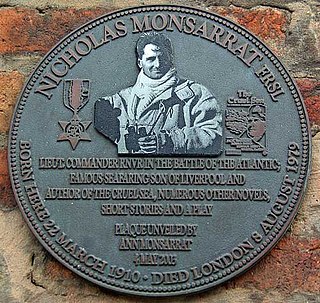
Lieutenant Commander Nicholas John Turney Monsarrat FRSL RNVR was a British novelist known for his sea stories, particularly The Cruel Sea (1951) and Three Corvettes (1942–1945), but perhaps known best internationally for his novels, The Tribe That Lost Its Head and its sequel, Richer Than All His Tribe.

Edward Santree Brophy was an American character actor and comedian, as well as an assistant director and second unit director during the 1920s. Small of build, balding, and raucous-voiced, he frequently portrayed dumb cops and gangsters, both serious and comic.
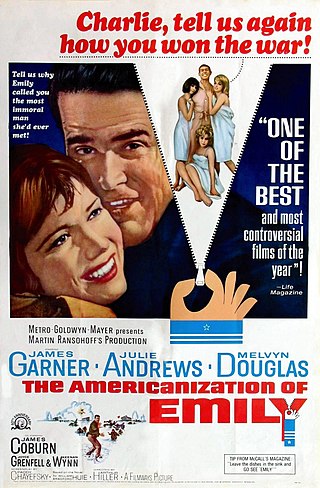
The Americanization of Emily is a 1964 American black-and-white black comedy anti-war film directed by Arthur Hiller, written by Paddy Chayefsky, and starring James Garner, Julie Andrews, Melvyn Douglas, James Coburn, Joyce Grenfell, and Keenan Wynn. Set during World War II, the film follows a United States Navy adjutant who is roped into a reckless interservice rivalry-fueled stunt by his superiors, becoming a war hero by being the first American sailor killed on D-Day.
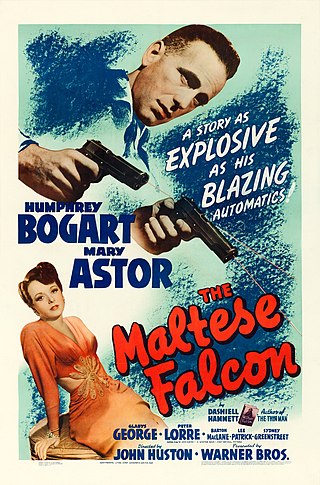
The Maltese Falcon is a 1941 American film noir in which a San Francisco private detective deals with three unscrupulous adventurers, all seeking a jewel-encrusted falcon statuette. Written and directed by John Huston in his directorial debut, the film was based on the 1930 novel The Maltese Falcon by Dashiell Hammett and is a remake of the 1931 film of the same name. It stars Humphrey Bogart as private investigator Sam Spade, Mary Astor as his femme fatale client, and as villains Peter Lorre and Sydney Greenstreet.
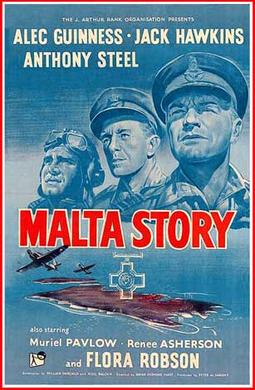
Malta Story is a 1953 British war film, directed by Brian Desmond Hurst, set during the air defence of Malta during the Siege of Malta in the Second World War. The film uses real and unique footage of the locations at which the battles were fought and includes a love story between an RAF reconnaissance pilot and a Maltese woman, as well as the anticipated execution of her brother, caught as an Italian spy. The pilot's character is loosely based on Adrian Warburton, and the Maltese woman's brother's is based on Carmelo Borg Pisani, who was executed in 1942.

Pastoral is a novel by the English author Nevil Shute. It was first published in 1944 by Heinemann. Its theme is that even in the midst of war, and among warriors, everyday life, such as romance, will continue.
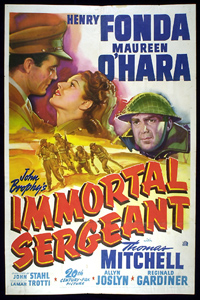
Immortal Sergeant is a 1943 American war film directed by John M. Stahl for 20th Century Fox. Set in the North African desert during World War II, it stars Henry Fonda as a corporal lacking in confidence in both love and war, Maureen O'Hara as his girlfriend, and Thomas Mitchell as the title character. The film was based on the 1942 novel of the same name by John Brophy.

Eyewitness is a 1970 British thriller film directed by John Hough and starring Mark Lester, Susan George and Lionel Jeffries. Its plot follows a young English boy who, while staying with his grandfather and adult sister in Malta, witnesses a political assassination, and is subsequently pursued by the killers—however, due to his habitual lying, those around him are hesitant to believe his claims. It is an adaptation of the novel by Mark Hebden, the pen name for John Harris, and bears similarity to Cornell Woolrich's novelette "The Boy Cried Murder", originally adapted for film as The Window.
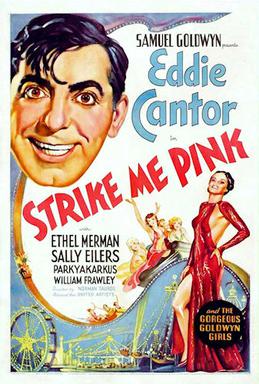
Strike Me Pink is a 1936 American musical comedy film directed by Norman Taurog, starring Eddie Cantor and Ethel Merman, and produced by Samuel Goldwyn.
The Hitler Gang is a 1944 American pseudo-documentary film directed by John Farrow, which traces the political rise of Adolf Hitler. Described as a "documentary-propaganda" film by its studio, Paramount Pictures, the historical drama is based on documented fact and marks the first serious effort to portray Hitler in film. The filmmakers chose to avoid casting stars in the lead roles, assembling instead a remarkable company of lookalikes to play Hitler, Goebbels, Himmler, Göring, and other leading Nazis.

John Brophy was a British soldier, journalist and author who wrote more than 40 books, mostly based on his experiences during World War I.

Benighted is a 1927 novel by the British writer J.B. Priestley. Priestley's second published novel, the story explores the post-First World War disillusionment that Britain felt during the time period. A number of travellers are forced to take shelter at an old Welsh country house during a storm. The book was released in the United States in 1928.

If the Gods Laugh is a 1925 romantic adventure novel by the British writer and explorer Rosita Forbes. It is set against the backdrop of the Italian colonization of Libya.

King's Mate is a 1928 romantic adventure novel by the British writer and explorer Rosita Forbes. While staying in Morocco a young Englishwoman becomes lost in the desert and is rescued by a mysterious figure known as the White Sheik, who proves to be an Englishman.

The Day They Robbed the Bank of England is a 1959 crime novel by the British writer John Brophy.

Turn the Key Softly is a 1951 novel by the British writer John Brophy. It follows the lives of three women in the first dozen hours after they are released from prison.
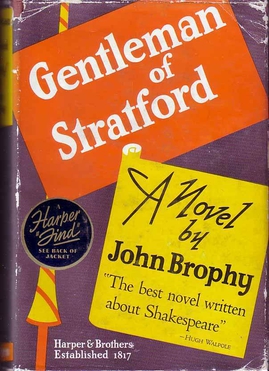
Gentleman of Stratford is a 1939 historical novel by the British writer John Brophy. It is a fictional account of the life of William Shakespeare. Brophy carefully researched the novel to use existing documentary evidence about the playwright. The novel was published in the United States by Harper. It helped launch Brophy's career as a novelist. Author Hugh Walpole described it as "the best biographical novel yet written about Shakespeare".

Immortal Sergeant is a 1942 war novel by the British writer John Brophy. The novel is set during the North African campaign of the Second World War and seen through the eyes of a British corporal fighting across the Libyan desert whose comrade, a sergeant, is killed.

Waterfront is a 1934 crime drama novel by the British writer John Brophy. It is set in his native Liverpool amongst the world of dockworkers.



















